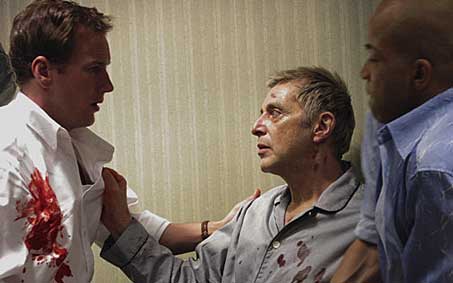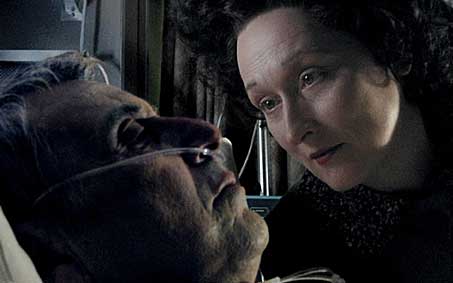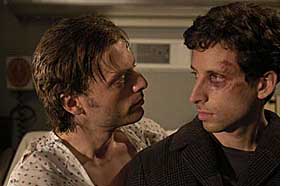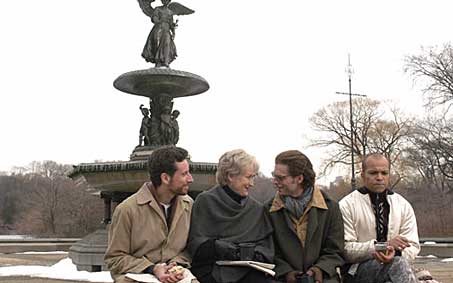
 |
||||||
|
GAY
FILM REVIEWS BY MICHAEL D. KLEMM
|
||||||
|
Angels in America HBO Video, 2003 Director: Screenplay: Starring: Unrated, 352 minutes
|
Love
In the Time
Tony Kushner's mighty 2 part, 6 hour play, Angels in America: A Gay Fantasia On National Themes, is, quite simply, one of the most important dramas of the late 20th century. Like Leo Tolstoy's War and Peace, Angels in America is a sweeping work of literature. Epic in scope, reality and dreams are woven throughout its fabric while juggling multiple characters and storylines. Angels may be the pinnacle of gay theatre. The importance of its Broadway success in the early 90s can not be overstated. |
|
Angels in America begins in New York City, 1985, as AIDS was devastating the gay community. The crisis is contextualized within the politics of the era. At the play's center is Prior Walter (Justin Kirk), a young man with AIDS. His partner, Louis Ironson (Ben Shenkman) is unable to deal with Prior's illness and abandons him. To parallel their story, we meet Harper (Mary-Louise Parker), the valium-addicted and disturbed wife of Joe Pitt (Patrick Wilson), an ambitious young Republican - and deeply closeted - lawyer. Both are Mormons who re-located from Salt Lake City to Manhattan. |
|
|
|
|
 |
|
| As their lives intertwine, the story gains in momentum. Joe Pitt is Cohn's hand-picked protege to go to the Justice Department in Washington - where he can insure that Cohn's disbarment hearings never get to court. As Harper grows more and more unstable, Joe leaves her and winds up in a toxic relationship with Louis. Harper and Prior meet in a shared hallucination/dream sequence. Prior's best friend, the nurse Belize (Jeffrey Wright), becomes Roy Cohn's caregiver when he is admitted to the hospital. Prior is visited by an angel, who crashes through his ceiling, at the climax of Part One. | |
|
|
|
Kushner is food for the brain. But fear not, despite its complexity, the basic storyline is easy to follow. For those who might think that Angels is a 6 hour downer, they couldn't be more wrong. Angels is often hysterically funny, the laughs co-existing with intense drama. How can anyone not relish the irony of Roy Cohn dying from AIDS or not be amused by the ghost of Ethel Rosenberg sitting in his hospital room, rejoicing in his misery? |
|
 |
|
|
HBO omits the subtitle to Kushner's epic: A Gay Fantasia on National Themes - perhaps to increase its viewership - but the secondary title is important. The "national themes" are examined through a queer lens that isn't always a pair of rose colored glasses. |
|
|
I mentioned War and Peace earlier. Besides a large cast of characters, Angels in America shares something else with Tolstoy's epic: the theme of movement, migration, progress, change. Louis' Jewish grandparents came to America from Russia. Joe and Harper migrate across America to NY, as does Joe's mother, Hannah. Their Mormon faith also began with a journey across the country in the other direction. (The fall of the Soviet Union is referenced, though the HBO film regrettably cuts the "oldest living Bolshevisk's" important monologue from the beginning of Part Two rendering the title Perestroika a mystery to first time audiences unfamiliar with the play.) A rabbi references the journey within us all. Finally there is the angel demanding that mankind stop moving so that God will return to heaven. |
|
 Law
and justice are also important in Kushner's universe - a world of chaos
which Roy Cohn eagerly embraces. Louis breaks the worst law by abandoning
Prior, Joe does the same while trying to remain a good Mormon even as Cohn
goads him to "transgress." To Cohn, there are those who make the
law and those who are subject to it. The law is the new religion. "Lawyers
are the high priests of America," Cohn tells Belize. "Sue somebody,
it's good for the soul." Law
and justice are also important in Kushner's universe - a world of chaos
which Roy Cohn eagerly embraces. Louis breaks the worst law by abandoning
Prior, Joe does the same while trying to remain a good Mormon even as Cohn
goads him to "transgress." To Cohn, there are those who make the
law and those who are subject to it. The law is the new religion. "Lawyers
are the high priests of America," Cohn tells Belize. "Sue somebody,
it's good for the soul." |
|
|
Those who have never seen Angels on stage have been denied a rare treat. In 1997, I saw Millennium Approaches fully staged here in Buffalo at Studio Arena, and Perestroika as a powerful staged reading by Part One's cast during the last week of the play's run. Angels is also one of the most readable plays in print. Kushner beautifully juggles the large cast of characters. His staging is a marvel, two opposing scenes often play in a "split-screen" technique on opposite ends of the stage.(The HBO film replicates this by cutting the two scenes together.) What is most admirable about the HBO version is the way that it was able to retain most of the elements that made the play so unique. |
|
|
|
|
| Director Mike Nichols has worked both on stage and on film and so he was an ideal choice to helm the production.But even he has trouble visualizing all of the fantastic elements that are so important to the play. A fine line often has to be tread when trying to film a play that celebrates its theatricality to this degree. Very few films bring this off (one of the only ones that come to mind is John Greyson's Lilies). On stage, the actors played multiple roles and happily this is also true in the HBO film. Meryl Streep plays Joe's mother, Hannah, the ghost of Ethel Rosenberg and the old rabbi whose sermon opens the film. Emma Thompson plays the angel, Prior's doctor, and a homeless woman. Jeffrey Wright plays Belize and he also plays Mr. Lies, Harper's imaginary travel agent friend. Most of the leads reappear as the angels in Heaven. This was a nice homage to the way Angels was presented onstage and it works well in the film. | |
|
|
|
|
In fact, I find most of the more traditional scenes (which make up at least 2/3 of the film) to be almost flawless. Almost. There was no need for footage of outer space when Prior first hears the angel's voice, or the microscopic blood photography that is shown when Cohn is diagnosed with AIDS; these interruptions are too intrusive and take the viewer out of the film. The incidental music also leaves much to be desired and sometimes ruins a scene that was playing much better in silence. But, all nitpicking aside, the pluses overwhelm the minuses and the HBO version is probably the best realized film of Angels in America that we can ever hope for. |
|
 |
|
|
Notes on the cast. Jeffrey Wright also played the role of Belize on stage. Justin Kirk (Prior) played the blind Bobby in Terrence McNally's Love! Valour! Compassion! (1997) onstage and onscreen. Al Pacino played a gay(?) bankrobber in Dog Day Afternoon (1975) and, of course, starred in 1980's Cruising. Mary Louise Parker appeared in Longtime Companion (1990). Out British Actor Simon Callow (Two Weddings and a Funeral, Bedrooms & Hallways) appears as one of the ghosts who appear to Prior to herald the angel's arrival. Meryl Streep played Woody Allen's lesbian ex-wife in Manhattan (1979). Emma Thompson also starred in Mike Nichol's earlier HBO film of another stage triumph, Margaret Edison's Wit (2001). Finally, Tony Kushner has a cameo as one of the old rabbi's colleagues. |
|
|
Al
Pacino also appears in: Mary-Louise Parker
also appears in: Simon Callow also
appears in:
|
|